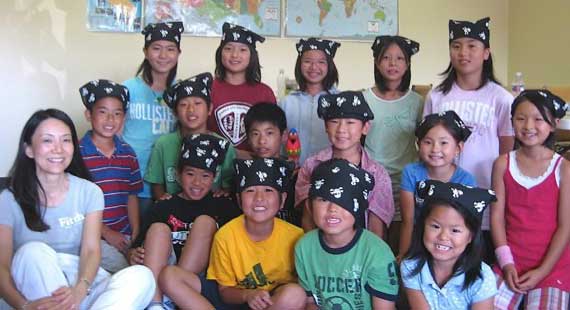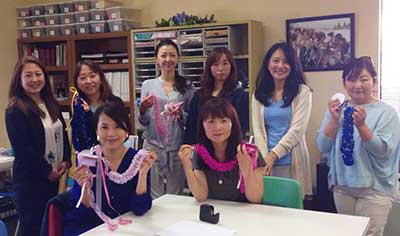‘They’re not gods’
Ben Greene
Pastor & writer
- Missions
Every day in Eri Kobayashi’s childhood, her parents took her to a Tokyo daycare on their way to work. One day, Kobayashi’s daycare teacher held up a Japanese Shinto book.
The little boys and girls saw two gods standing on clouds and stirring a pot with a stick. When the two gods lift the stirring stick, four drops fall into the ocean, a theological explanation for Japan’s major islands.
“I thought they’re not gods,” she said of those Shinto deities. “The real god is the one who created the sky that they were in and the ocean that those things fell into.”
Kobayashi’s earliest insights about God inspire her as a global worker who shares Christ with Japanese people near Los Angeles. She is part of the Japan Initiative Converge started to make disciples among the least-reached people group from the island country.
Fear existed first, so faith came later
Such clarity and conviction in a child not yet 5 years old rose out of a family where faith, fear and culture fought for control. On the one hand, Kobayashi’s grandfather was Roman Catholic. Her grandfather’s influence introduced some opportunities to grasp God’s identity.
On the other hand, her grandmother lived through the U.S. bombing of Japan during World War II. When the island nation surrendered, the women thought U.S. soldiers would commit atrocities. So they hid in bamboo forests and trained for days with sharpened sticks as they awaited the worst.
Instead, American soldiers who came spoke in Japanese, asking if everyone was OK. Therefore, Kobayashi’s grandmother learned of the forgiving God she’d never met.
“That was my favorite story,” Kobayashi said. “She told my brother and me this story every Saturday.”
Faith in God replaced Kobayashi’s grandmother’s fear, influencing a little girl to question the Shinto creation narrative, despite her parents’ unbelief. An authentically Japanese spirituality like Kobayashi’s creates conviction and credibility as she serves the diaspora in California.
Kobayashi encounters the same God through a different book
Kobayashi moved to the Los Angeles area and graduated high school in Southern California. Kobayashi later studied psychology in Japan for one course toward receiving credentials to teach English.
Her professor used the Bible as one of his teaching texts, a decision that required Kobayashi to find the Old and New Testaments in one volume. That’s not easy in Japan, where a standalone New Testament is much more common.
“I took [the Bible] to the classroom and opened it up,” she said.
What she found first took her right back to daycare. She read Genesis 1:1, reading how, in the beginning, God created the heavens and the earth.
“That’s what I thought of looking at the picture book” in her childhood, she added.
The God she’d glimpsed as a preschooler appeared again as the psych student read Genesis. After that, Kobayashi’s faith and heart for the Lord grew more steadily.
Now, as a Converge global worker, she labors among the least-reached Japanese so that they become disciples who make disciples.
Related: Gain a full appreciation for God’s work and prayer’s power in Converge’s Japan Initiative.
Thank God for Tupperware parties
Kobayashi wouldn’t be a global worker among the Japanese diaspora in L.A. if not for a Tupperware party. In 1991, a close friend “begged and begged” a reluctant Kobayashi to listen to the product marketing for food storage. So she went and found herself alongside other Japanese women.
Emiko Takeda was one of those women. Her husband ministered to Japanese speakers in the south bay area as a missionary from Japan.
Takeda had organized a summer school at Pacific View Baptist Church in Torrance to teach the Japanese who were new to the area. Eventually, Takeda asked Kobayashi to teach English to Japanese youth, something she still does.
At first, she ministered to children from three or four families. Over time, as her partnerships developed with other global workers among the Japanese, God grew her tutoring ministry until she influenced more than 50 children with the story of Christ, the one true God.
“When we got 50 kids, I became bold,” she said. “I think the community as a whole came to trust us.”
In 1999, Pacific View named Kobayashi the director of its Japanese ministry. She later went to Fuller Seminary and studied theology and ministry, including some research into the spiritual development of children.
The summer school and tutoring gradually became the Japanese Bible Day Camp. Kobayashi later added social studies and science studies that related to biblical teaching.
“What would I have never known if my friend hadn’t invited me to this Tupperware party?” she said. “He had a purpose in me, which is to minister to the kids. When I’m with my kids, I’m so happy.”
Related: Converge helps global workers grasp God’s specific purpose for them.
A never-ending story
Kobayashi has invested more than two decades in serving Japanese youth and children in America. In all that time, she’s seen people from her homeland accept Christ and become disciples as they entered adulthood.

She encourages and maintains friendships with these people through social media and visits back to Japan. Converge’s Japan Initiative team seeks to plant more churches in Japan to build a tighter network of congregations so returning Japanese continue to grow and follow Christ.
The initiative, led by Brian and Rachel Lusky, builds gospel-centered relationships with people in Osaka and Tokyo in Japan and the Japanese diaspora in Boston and South Bay, California.
Related: See the projects the Converge initiative started for Japanese people.
The Japanese are the world’s second-largest unreached people group. An incredibly intense work ethic to acquire and maintain good jobs is partially why the Japanese resist the gospel’s influence.
Another challenge is the high cost of living for those serving in Japan: It can take two years to raise enough support to live on the island nation.
Therefore, conversions and evidence of discipleship have been slow in coming. The widespread teaching of evolution causes the Japanese to believe they can’t be Christians. Shintoism and Buddhism manage life’s positive and negative experiences, creating a shelf of gods some Japanese want to add Jesus to.
Despite Japan’s status as a least-reached nation, where less than 2% know Christ as Lord, Kobayashi has confidence. Since she was a little girl, looking up at the Shinto deities taken as fact in Japan, she’s encountered the God who made the sky and the ocean. The God of the Bible opens doors for the Japanese to build relationships and find churches so they can follow him, just like she learned.
She said their hearts are receptive to the gospel, especially as they leave Japan. That frees them from their taboos and cultural pressures to conform to communal norms. That’s why she keeps building friendships through the Japanese Bible Day Camp and serving on the Japan Initiative team.
The God who made it all has become her heart’s hope. Therefore, she plans to keep telling others the story of her life: The real God, the total creator, offered forgiveness through Christ to a world that rebelled against him.
“There’s a window of opportunity in their hearts,” she said, for the story that can connect them to God.

Converge is asking God for a gospel movement among every least-reached people group – in our generation. Learn how we are playing a role in accomplishing the Great Commission and how you can be involved.
Ben Greene, Pastor & writer
Ben Greene is a freelance writer and pastor currently living in Massachusetts. Along with his ministry experience, he has served as a full-time writer for the Associated Press and in the newspaper industry.
Additional articles by Ben Greene.tmb-thumb115.png?Culture=en&sfvrsn=408181cb_1)

